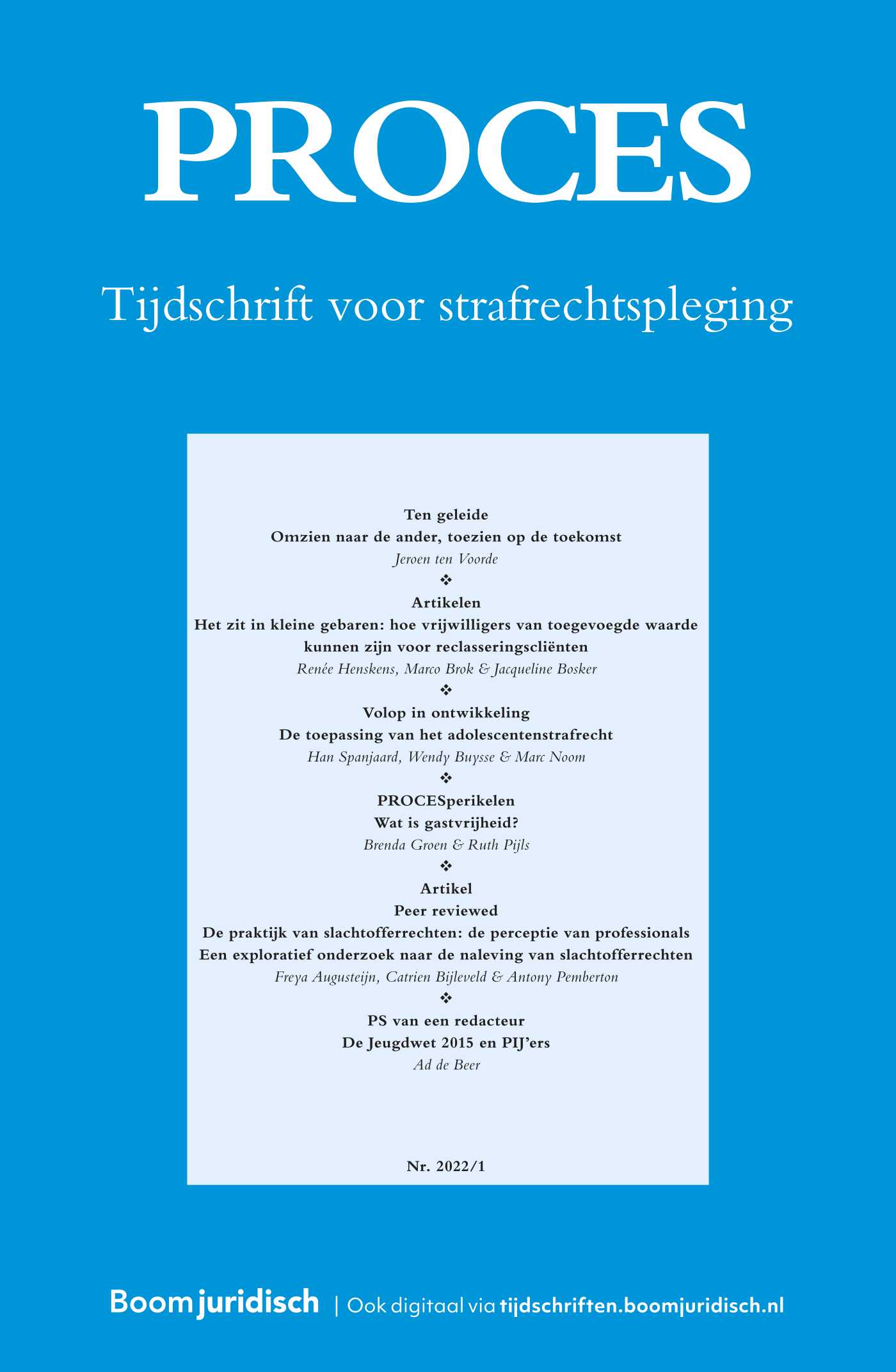|
This editorial offers an introduction to the current issue. |


PROCES
Meer op het gebied van Criminologie en veiligheid
Over dit tijdschriftMeld u zich hier aan voor de attendering op dit tijdschrift zodat u direct een mail ontvangt als er een nieuw digitaal nummer is verschenen en u de artikelen online kunt lezen.
| Redactioneel |
Mensen met een licht verstandelijke beperking in de strafrechtsketen |
| Trefwoorden | Editorial |
| Auteurs | Dr. Hendrien Kaal en Nico Overvest |
| SamenvattingAuteursinformatie |
| Artikel |
Mensen met een licht verstandelijke beperking in aanraking met politie en justitie |
| Trefwoorden | learning disability, police, interrogation |
| Auteurs | Dr. Xavier Moonen, MSc Marjolein de Wit en MSc Marjolein Hoogeveen |
| SamenvattingAuteursinformatie |
|
There are many situations in which people with a learning disability encounter law enforcement. Early recognition of their learning disability by police and justice authorities is necessary to ensure an appropriate manner of communication and handling that takes into account their limitations and abilities. Yet, without special knowledge, it is not easy to recognize the learning disability, especially if the limitations of the disability are mild. Diagnosing a learning disability requires taking into account several aspects, and a simply determination of the IQ is definitely insufficient. This article deals with the specific characteristics of people with a learning disability in their contacts with the police and the justice system. Furthermore recommendations are given as to how to interrogate them in a respectful and correct way. |
| Artikel |
Gedetineerden met een licht verstandelijke beperking |
| Trefwoorden | intellectual disability, prisoners |
| Auteurs | Dr. Hendrien Kaal |
| SamenvattingAuteursinformatie |
|
Signs that a more or less substantial group of people in Dutch prison experience problems as a result of an intellectual disability, suggest that it makes sense to track this group and subsequently offer them the support they need. The reason this does not happen in practice is a lack of knowledge on various fronts. As it is, it is not clear how large the group of people with an intellectual disability in Dutch prisons is, what problems they face, and what could aid them. This article highlights what we do know and what we do not know with regards to this group. |
| Artikel |
De reclassering en licht verstandelijk beperkte cliënten |
| Trefwoorden | intellectual disabilitie, probation, supervision, screening |
| Auteurs | René Poort, Jacqueline Bosker en Marjolein Agema |
| SamenvattingAuteursinformatie |
|
The Dutch probation service has some indications that a substantial part of the probationers have intellectual disabilities. However, there is a lack of reliable information on the exact numbers. Three issues concerning probationers with intellectual disabilities are discussed, that ask further research and development in the field of probation. The first issue is the necessity to improve screening and assessment. Reliable and valid assessment of an intellectual disability is important to match interventions and supervision to the possibilities and skills of probationers. A second issue is the availability of interventions and policy that are suitable for probationers with intellectual disabilities. Some examples are given on offender supervision. Besides that, probation officers must have enough knowledge and skills to supervise this group in an effective way. A third issue is the co-operation of the probation service with mental healthcare. |
| Praktijk |
Een fraai duo |
| Auteurs | Jeannette Bruins |
| SamenvattingAuteursinformatie |
|
The author describes new developments of criminal justice in practice |
| Artikel |
Verstandelijke beperking in de forensische psychiatrieOverzicht en presentatie van een onderzoek naar het effect van langdurende klinische behandelingen |
| Trefwoorden | learning disabilitie, clinical treatment, evaluation, Routine Outcome Monitoring |
| Auteurs | Dr. Klaus Drieschner, Isabel Marrozos en Drs. Brenda Hesper |
| SamenvattingAuteursinformatie |
|
The first part of the article provides a review of the literature concerning the prevalence of people with learning disabilities in forensic settings, the treatment programs for this population, and the evidence for the effectiveness of these programs. In the second part, a large prospective study into the effectiveness of long-term inpatient treatment in a Dutch treatment center is reported. Preliminary results indicate that the percentage of improved patients in terms of reduction of criminogenic needs increases steadily, and that about half of the patients significantly improve within the first two years of the treatment. In addition, patients are released to settings which are less restrictive than the pre-treatment settings. |
| Artikel |
Hetzelfde maar toch (heel) andersJongeren met een licht verstandelijke beperking en een PIJ-maatregel vergeleken met normaal begaafde PIJ’ers |
| Trefwoorden | youth offenders, intellectual disability, non-intellectual disability |
| Auteurs | Dr. Hendrien Kaal, Eddy Brand en Maroesjka van Nieuwenhuijzen |
| SamenvattingAuteursinformatie |
|
Casefile analysis concerning serious youth offenders under a mandatory treatment order in The Netherlands showed that, amongst youth offenders of various IQ-levels (IQ < 70, IQ 70-85, and IQ > 85), behavioural and mental health problems and social background characteristics are in many respects very similar. However, differences found in for example social skills and relationships and the needs inherent with having an intellectual disability (ID) have important implications for the way treatment is offered. As a large proportion of the serious youth offenders has an ID, this is important to consider. Furthermore, as intelligence has a dynamic aspect, the authors advise to occasionally reassess these youths. |
| Column |
Laveren tussen nature en nurture |
| Trefwoorden | Column |
| Auteurs | Janine Janssen |
| SamenvattingAuteursinformatie |
|
In a column a journal editor or an author expresses his or her opinion on a particular subject. |
